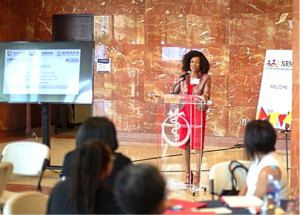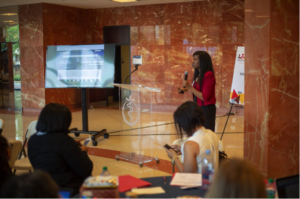Written by: Kimberly Lawson, MPH and Meldra Hall, MPH
The National Research Mentoring Network (NRMN) kicked off a Booster Dose Grantsmanship Coaching Group training event on August 9 -10, 2018 in Atlanta Georgia.

The entire Booster group including Program Director and Coaching Groups Director, Investigators, Coaches, and Administration.
NRMN’s Research Resources and Outreach Core (RROC) at Morehouse School of Medicine and
the Professional Development Core (PDC) at the University of Utah hosted the Booster training in collaboration with The University of Alabama at Birmingham and Northwestern University Feinberg School of Medicine. The Booster program- designed to provide additional grantsmanship training- was launched to provide support to 25 past participants and to host a grant writing workshop with coaching groups led by 7 past coaches from NRMN grantsmanship programs.

Director of the RROC and NRMN Multi-PI, Dr. Elizabeth Ofili, welcomes the group of investigators attending the Booster Dose program.
The two-day event began with the Coaches’ refresher training session on a Novel Coaching-Group Approach to Developing Grant Writing Skills, led by Richard McGee, PhD (Program Director for the Northwestern University Grant Writing Coaching Group Model) and Jeffrey Engler, PhD (RROC Coaching Director).
Day 1 kicked off with a warm welcome from the RROC Multi-PI and Director of the Research Resources and Outreach Core, Elizabeth Ofili, MD, MPH, FACC. Since these investigators were still actively writing NIH-style research proposals, she encouraged them to lean on the resources made available to them through the Health Equity Collaboratory as well as the coaches’ expertise and peer networks as they continue to pursue research independence.

The Health Equity Learning Collaboratory is introduced by Ms. Meldra Hall to investigators as a tool for resources to support their professional development.
After the introductions and welcome, the group separated into their pre-assigned coaching groups, made up of 3-4 investigators and 1 coach, separate by research interest. During the break-out sessions, the 7 research-based coaching groups initiated the peer-to-peer critique and coaching group discussions, focusing particularly on logic, rhetoric patterns, and structural flow of the Specific Aims Page. Much of the time on day 2 was spent in grant writing coaching sessions reviewing the specific aims of each investigator. Subsequently, a Question & Answer session was held to obtain feedback on how NRMN can further guide trainees to successful grant submissions.

Investigators and Coaches listen to introductory remarks from Coaching Director, Dr. Jeff Engler.
In addition to the coaching groups, the Health Equity Learning Collaboratory (EQ-Collaboratory) was introduced to the investigators. This virtual community was designed to support the professional development provided to investigators by providing accountability, constructive feedback, and access to peer networks. The groups will meet weekly over the next four months in the EQ-Collaboratory. Investigators will use this distance technology to providing feedback on revised Specific Aims Pages and other major components of the proposals. We are very excited about the submission and award outcomes for these investigators in the Booster Dose Program and the work they will do in the EQ-Collaboratory.